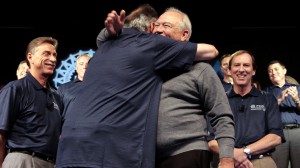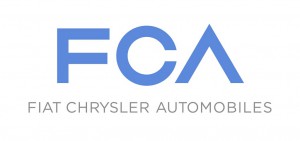Less than a week after workers rejected a tentative four-year contract, with talks aimed at sweetening the deal going nowhere, the United Auto Workers Union has issued a strike notification to Fiat Chrysler Automobiles.
Unless the two sides can break the impasse by 11:59 PM on Wednesday, the trans-Atlantic automaker could be hit by the first major walkout in the auto industry since well before the start of the devastating recession that sent the former Chrysler Corp. into bankruptcy.
The impact could be substantial for FCA, but the UAW and its members also could be seriously harmed by a confrontation, something union President Dennis Williams admitted would be a “failure” when contract talks got underway over the summer.
“FCA US confirms that it has received strike notification from the UAW,” the maker said in a brief statement released Tuesday afternoon. “The Company continues to work with the UAW in a constructive manner to reach a new agreement.”
(Ford narrowly averts crippling strike at high-profit F-150 plant. Click Here for the latest.)
Things looked a lot brighter when the UAW began separate negotiations with each of Detroit’s Big Three makers nearly three months ago. An upbeat Williams expressed his desire to work with the companies to find satisfactory solutions to a range of issues plaguing both labor and management.

FCA Chief Executive Sergio Marchionne and UAW President Dennis Williams shared an impromptu hug to kick off contract talks between the two companies.
On the company side, FCA, General Motors and Chrysler made it clear they wanted to hold down labor costs which had become far more competitive due to union concessions made during the Great Recession. They also went back to the bargaining table hoping to rein in health care spending.
The UAW, in turn, was looking to recover some of those concessions, winning raises for the first time in a decade, ensuring job security and bringing an end to a hated two-tier wage system – or at least capping it.
As has been the union’s traditional practice, it chose a single maker to focus its efforts on as talks approached the September 15th deadline. FCA seemed the company with the most to give, something the UAW hoped would serve as a pattern for contracts to follow with GM and Ford.
But things didn’t go quite as well as planned. The negotiations stretched out beyond the midnight deadline and, once workers got the details of the eventual agreement, resentment quickly began to build. While there was more money, the two-tier system went largely unchanged. But revisions to the lush union health care benefits seemed likely to increase worker payouts. And FCA was permitted to move some production to Mexico, even though other work would come back to the States.
One after another, FCA plants voted the contract down, the agreement losing by an almost two-to-one margin.
(For more on why UAW members said “no,” Click Here.)
Union leaders were suitably chastised, Williams acknowledging the UAW hadn’t been as “transparent” as workers demanded. But he also warned the rank-and-file it would be difficult to get Fiat Chrysler to sweeten its offer – as now becomes apparent.
Even a short strike could cost both sides millions of dollars. A longer walkout could prove devastating, observers warn.
FCA CEO Sergio Marchionne now finds himself in a tough spot, according to industry analysts. Though it has experienced more than four years of consecutive monthly sales gains and improving profitability, the carmaker is considered the weakest among the Detroit Big Three. It is getting set to launch an IPO of its Ferrari brand to raise much-needed cash, in fact.
But the UAW has its own challenges. For one thing, it has suffered a sharp decline in membership over the past two decades, and a change in Michigan law could allow autoworkers in the union’s home state to opt out of membership if they become disillusioned.
A strike could also hurt the UAW by scaring away workers at the so-called “transplant assembly plants” operated by makers such as Toyota, Mercedes-Benz and Hyundai. Organizing those factories has been a largely failed goal of the union for a quarter century, though it recently scored a small but critical success, winning organization rights at the Volkswagen factory in Chattanooga, Tennessee.
A long conflict – or a poor contract – could buoy the argument of union critics who say the UAW brings nothing but strife to the auto industry.
(What was in the original FCA contract offer? Click Here to find out.)


The true failure this time appears to be a sellout by the UAW negotiating team. They are the ones who should be dismissed and repay their UAW compensation, for such an unfair contract proposal.